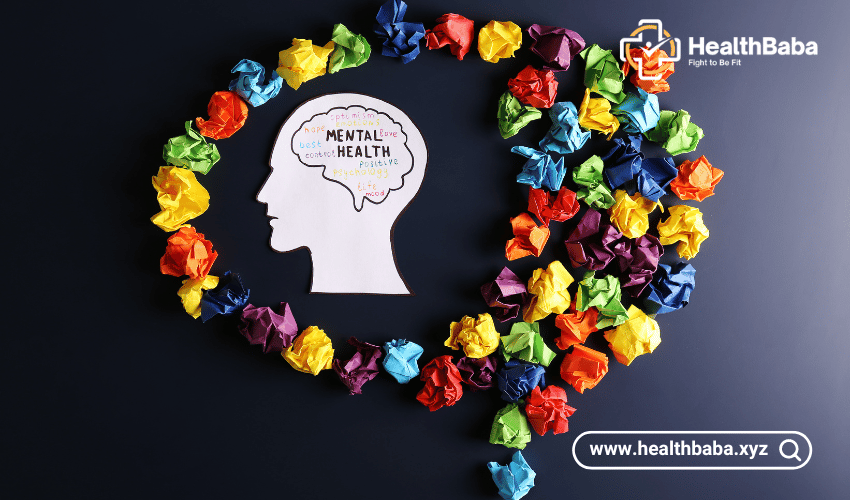Mental health can be improved through therapy, medication, support systems, and self-care practices. Achieving good mental health requires a holistic approach that addresses the individual’s emotional, psychological, and social well-being.
This includes seeking professional help, building strong relationships, adopting healthy lifestyle habits, and paying attention to one’s emotional needs. By prioritizing mental health and utilizing available resources, individuals can take steps towards improving their overall well-being and leading fulfilling lives.
It is important to acknowledge that mental health improvement is a lifelong journey, and it is essential to regularly check in with oneself and make necessary adjustments to maintain mental well-being.
Understanding The Mind-body Connection
The mind and body are deeply interconnected, each exerting a powerful influence on the other. This symbiotic relationship forms the foundation of our overall well-being. By developing a better understanding of the mind-body connection, we can take proactive steps towards improving and maintaining our mental health.
Exploring The Link Between Mental And Physical Health
Our mental health is greatly influenced by our physical well-being. Numerous studies have shown that poor physical health can contribute to the development of mental health issues. Conversely, good physical health can have a positive impact on our mental well-being.
The mind and body function as a unified entity, constantly communicating and influencing one another. When we engage in regular physical exercise, it releases endorphins that not only boost our mood but also reduce symptoms of anxiety and depression. These natural ‘feel-good’ chemicals energize the body while simultaneously calming the mind.
Furthermore, physical activity promotes healthy sleep patterns, which are crucial for maintaining good mental health. Quality sleep enhances cognitive function, concentration, and memory, allowing the mind to process emotions and manage stress more effectively.
How Stress Impacts Mental Well-being
The impact of stress on mental well-being cannot be overstated. When we experience stress, our bodies go into a fight-or-flight response, triggering the release of stress hormones such as cortisol and adrenaline. Over time, chronic stress can lead to mental health disorders such as anxiety and depression.
Stress affects the mind and body in various ways. Physically, it can manifest as muscle tension, headaches, and digestive issues. Mentally, stress can lead to racing thoughts, difficulty concentrating, and feelings of overwhelm. Chronic stress also weakens the immune system, making us more susceptible to illness.
It’s essential to recognize and manage stress effectively in order to protect our mental well-being. Engaging in relaxation techniques such as deep breathing exercises, mindfulness meditation, or yoga can help calm both the mind and body, reducing the impact of stress and promoting overall mental wellness.
The Role Of Diet And Exercise In Promoting Inner Wellness
Diet and exercise play a vital role in promoting inner wellness. A balanced diet rich in nutrients provides the brain with the fuel it needs to function optimally. Nutrient deficiencies, such as those lacking in B vitamins or omega-3 fatty acids, can negatively impact mental health.
Regular exercise not only benefits our physical health but also has a profound impact on our mental well-being. Exercise increases blood flow to the brain, improving cognitive function and overall mental clarity. It helps release endorphins, reduces stress, and enhances our overall sense of well-being.
When it comes to mental health improvement, a holistic approach that considers both the mind and body is essential. By understanding the mind-body connection, managing stress effectively, and adopting a balanced diet and exercise routine, we can take significant steps towards nurturing our inner wellness.
Practicing Mindfulness For Mental Wellness
Practicing mindfulness can greatly improve mental wellness, offering a holistic approach to enhancing mental health. By being present in the moment and non-judgmentally observing our thoughts and feelings, we can cultivate mental clarity, reduce stress, and foster overall well-being.
Exploring The Benefits Of Mindfulness Meditation
One powerful tool that can significantly improve mental well-being is mindfulness meditation. By practicing mindfulness, individuals can cultivate a calm and focused mind, enhancing their overall mental health. Research has shown numerous benefits associated with this ancient practice, making it an excellent addition to anyone’s mental wellness routine.
- Enhanced self-awareness
- Reduced stress and anxiety levels
- Improved concentration and focus
- Boosted resilience and emotional well-being
- Increase in overall life satisfaction
- Improved sleep quality
| BENEFITS OF MINDFULNESS MEDITATION | |
|---|---|
| 1 | Enhanced self-awareness |
| 2 | Reduced stress and anxiety levels |
| 3 | Improved concentration and focus |
| 4 | Boosted resilience and emotional well-being |
| 5 | Increase in overall life satisfaction |
| 6 | Improved sleep quality |
Techniques For Incorporating Mindfulness Into Daily Life
To experience the benefits of mindfulness, it is essential to incorporate this practice into our daily lives. Here are some effective techniques to make mindfulness a part of your routine:
- Start your day with a mindful morning ritual:
Begin your day by setting aside a few minutes for mindfulness. Take deep breaths, pay attention to the sensations in your body, and set positive intentions for the day ahead.
- Practice mindful eating:
When having a meal, try to focus fully on the experience of eating. Savor each bite, notice the flavors and textures, and connect with the nourishment provided by the food.
- Take mindful breaks during the day:
Allocate short breaks throughout your day to engage in mindful activities such as deep breathing exercises, gentle stretching, or simply observing your surroundings without judgment.
- Integrate mindfulness into daily tasks:
Transform routine activities like washing dishes or taking a shower into mindful practices by paying full attention to the sensory experience, the movements of your body, and the thoughts and emotions that arise.
Developing Self-awareness And Reducing Stress Through Mindfulness
Mindfulness plays a crucial role in the development of self-awareness and the reduction of stress. By practicing mindfulness, individuals can cultivate a state of focused awareness, becoming attuned to their thoughts, emotions, and physical sensations. This heightened self-awareness enables them to recognize stress triggers, interrupt negative thought patterns, and respond skillfully to challenging situations.
Moreover, mindfulness practice promotes the activation of the parasympathetic nervous system, responsible for the body’s rest and relaxation response. This activation helps to reduce the harmful effects of stress on mental and physical health, contributing to a greater sense of well-being and balance.
Through consistent mindfulness practice, individuals can cultivate a more compassionate and non-judgmental outlook towards themselves and others. This shift in perspective can lead to increased acceptance, improved relationships, and a more positive overall mindset.
Cultivating Healthy Habits For A Balanced Mind
Cultivating healthy habits is key to maintaining a balanced mind and promoting overall mental health. In today’s fast-paced and high-pressure world, it is crucial to prioritize self-care and establish routines that support our mental wellbeing. By focusing on key areas such as quality sleep, nurturing positive relationships, and managing work-life balance, we can create a solid foundation for mental health improvement. Let’s delve deeper into these essential aspects and explore effective strategies for achieving a more balanced and fulfilling life.
The Importance Of Quality Sleep For Mental Health
We often underestimate the power of a good night’s sleep, but it plays a critical role in our mental health and overall well-being. Lack of sleep can lead to fatigue, irritability, poor concentration, and even contribute to the development of mental health disorders like anxiety and depression. Achieving quality sleep requires adopting healthy sleep habits, such as:
- Establishing a consistent sleep schedule, going to bed and waking up at the same time every day.
- Creating a sleep-friendly environment by ensuring your bedroom is dark, quiet, and cool.
- Avoiding electronic devices, caffeine, and stimulating activities before bedtime.
- Practicing relaxation techniques like deep breathing or meditation to unwind before sleep.
By prioritizing quality sleep and incorporating these habits into our daily routine, we can enhance our mental clarity, emotional well-being, and overall quality of life.
Nurturing Positive Relationships And Social Connections
Human beings are social creatures, and our mental well-being is deeply influenced by the quality of our relationships and social connections. Cultivating positive relationships can provide emotional support, reduce stress, enhance resilience, and contribute to a sense of purpose and belonging. Here are some strategies to nurture these essential connections:
- Make time for loved ones: Set aside dedicated time to connect with family and friends, whether through face-to-face conversations, phone calls, or virtual meet-ups.
- Show empathy and kindness: Practice active listening, demonstrate empathy, and be supportive of others’ needs and feelings. Small acts of kindness can go a long way in building and maintaining strong relationships.
- Join community groups or participate in shared-interest activities: Engaging in activities or organizations aligned with your interests can help you meet like-minded individuals and expand your social network.
By prioritizing nurturing relationships and fostering meaningful connections, we can create a valuable support system that promotes mental well-being and enriches our lives.
Strategies For Managing Work-life Balance And Reducing Burnout
Maintaining a healthy work-life balance is crucial for mental health, as excessive stress and burnout can take a serious toll on our well-being. Here are some effective strategies to achieve a better balance:
- Establish clear boundaries: Set specific boundaries between work and personal life. Avoid checking work emails or engaging in work-related activities outside of designated work hours.
- Practice self-care: Allocate time each day for activities that bring you joy and relaxation. Engage in hobbies, exercise regularly, practice mindfulness, or indulge in activities that rejuvenate your mind and body.
- Prioritize tasks and delegate when necessary: Set priorities, break tasks into manageable chunks, and delegate responsibilities when appropriate. This helps prevent overwhelm and ensures you have time for both work and personal pursuits.
By implementing these strategies, you can create a healthier work-life balance, reduce the risk of burnout, and foster a more harmonious and fulfilling lifestyle.
Unlocking The Power Of Self-care
Mental health improvement is a topic of growing importance in today’s fast-paced and stressful world. While seeking professional help such as therapy or medication is crucial, it’s equally important to recognize the significance of self-care in this journey. Self-care refers to taking deliberate actions to improve your physical, emotional, and mental well-being. By prioritizing self-care, you can unlock the power to cultivate a healthier mindset and promote long-term mental health. In this article, we will explore the significance of self-care, different practices and activities you can incorporate into your routine, and ways to prioritize self-care to ensure it becomes a habit.
The Significance Of Self-care In Mental Health Improvement
Self-care plays a pivotal role in mental health improvement. It empowers individuals to actively take charge of their well-being and create a positive impact on their mental state. Engaging in self-care activities helps reduce stress levels, enhance feelings of self-worth, and promote self-reflection. Practicing self-care regularly can help build resilience, improve coping mechanisms, and prevent burnout, ultimately contributing to overall mental well-being.
Exploring Different Self-care Practices And Activities
There are numerous self-care practices and activities that you can explore to improve your mental health. These activities can vary from simple daily rituals to more indulgent treats. Here are a few ideas to get you started:
- Engaging in regular exercise or physical activity, which releases endorphins, the body’s natural mood boosters.
- Practicing mindfulness and meditation to calm the mind, reduce anxiety, and increase self-awareness.
- Setting boundaries and learning to say no when necessary, ensuring you allocate time for yourself and avoid overwhelming commitments.
- Nurturing your hobbies and interests, whether it’s painting, gardening, or playing an instrument, as they provide a sense of fulfillment and joy.
- Engaging in social connections by spending quality time with loved ones or joining community groups that share similar interests.
Ways To Prioritize Self-care And Make It A Habit
Incorporating self-care into your daily routine can seem challenging, especially when life gets busy. However, prioritizing self-care is essential for long-term mental health improvement. Here are some tips to help you make self-care a habit:
- Set realistic goals: Start small and gradually increase the time and effort you devote to self-care activities. This will help prevent burnout and make it more manageable to incorporate into your routine.
- Establish a routine: Carve out dedicated time each day or week for self-care activities. Treat it as an appointment with yourself and honor the commitment.
- Eliminate guilt: Remember that self-care is not selfish but necessary for your well-being. Release any guilt or negative feelings associated with taking time for yourself.
- Find what works for you: Experiment with various self-care practices and activities to discover what resonates with you the most. Everyone’s preferences are unique, so tailor your self-care routine to suit your needs.
- Stay consistent: Consistency is key when it comes to self-care. Make it a non-negotiable part of your routine, just like eating or sleeping.
By prioritizing self-care and making it a habit, you can unlock the power to improve your mental health and lead a more fulfilling life. Remember, self-care is not a luxury but a necessity. So, start incorporating self-care practices into your routine and take proactive steps towards nurturing your mental well-being.
Seeking Support: Therapy And Beyond
When it comes to improving mental health, seeking the right support is crucial. Therapy has long been recognized as an effective tool to treat mental health conditions and promote overall well-being.
Understanding The Different Types Of Therapy Available
Therapy comes in many forms, each tailored to address specific needs and preferences. The key is finding the type of therapy that resonates with you and aligns with your goals. Here are some common types:
| Type of Therapy | Description |
|---|---|
| Cognitive Behavioral Therapy (CBT) | A goal-oriented therapy that focuses on changing negative thought patterns and behaviors to improve mental health. |
| Psychodynamic Therapy | A therapy approach that explores the unconscious mind and how past experiences shape current thoughts and behaviors. |
| Family Therapy | A form of therapy that involves working with the entire family to improve communication, resolve conflicts, and strengthen relationships. |
| Art Therapy | A creative therapy that utilizes artistic expression to explore emotions, reduce stress, and enhance self-awareness. |
Exploring Alternative Approaches To Mental Health Improvement
Aside from traditional therapy, there are alternative approaches that can complement or serve as alternatives to conventional therapy. These approaches often focus on holistic well-being and include:
- Mindfulness and meditation techniques
- Yoga and exercise for physical and mental well-being
- Nutritional and dietary adjustments for better brain health
- Herbal remedies and supplements known for their positive effects on mental health
- Support groups and community-based programs
Breaking The Stigma Around Seeking Professional Help
Unfortunately, there is a prevailing stigma attached to seeking professional help for mental health concerns. However, it is essential to overcome this stigma and prioritize our well-being. Seeking therapy or other forms of support does not make us weak or flawed – it demonstrates strength and a commitment to self-care.
By openly discussing our experiences and promoting understanding, we can dismantle this stigma and encourage others to seek the help they need without feeling ashamed.
Frequently Asked Questions For Mental Health Improvement
How Can I Improve My Mental Health?
Improving your mental health can be achieved by maintaining a balanced diet, getting regular exercise, practicing mindfulness and relaxation techniques, seeking support from loved ones, and considering therapy or counseling if needed.
What Are The Signs Of Poor Mental Health?
Signs of poor mental health include persistent feelings of sadness or hopelessness, extreme mood swings, withdrawal from social activities, difficulty concentrating, changes in appetite or sleep patterns, and thoughts of self-harm or suicide.
How Does Exercise Benefit Mental Health?
Exercise releases endorphins, which are natural mood-boosting chemicals in the brain. It reduces stress and anxiety, improves sleep patterns, enhances self-confidence, and provides a sense of accomplishment, overall contributing to better mental well-being.
Conclusion
Taking care of your mental health is crucial for overall well-being. By incorporating small changes into your daily routine, such as practicing self-care, exercising regularly, and seeking professional help when needed, you can improve your mental well-being. Remember, mental health is just as important as physical health, and should be prioritized.
So, make a conscious effort to nurture your mind and take steps towards a healthier and happier life.
















Add Comment